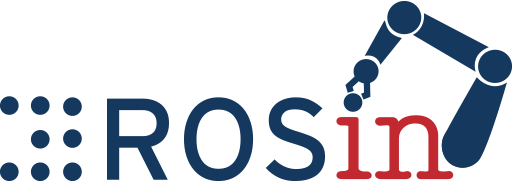This tool converts URDF files into Webots PROTO files or into Webots Robot node strings. Python 3.5 or higher is required.
pip install urdf2webots
On macOS, export the pip binary path to the PATH: export PATH="/Users/$USER/Library/Python/3.7/bin:$PATH"
git clone --recurse-submodules https://github.com/cyberbotics/urdf2webots.git
pip install --upgrade --editable urdf2webots
python -m urdf2webots.importer --input=someRobot.urdf [--output=outputFile] [--normal] [--box-collision] [--tool-slot=linkName] [--help]
The script accepts the following arguments:
- -h, --help: Show the help message and exit.
- --input=INPUT: Specifies the URDF file to convert.
- --output=OUTPUT: If set, specifies the path and, if ending in ".proto", name of the resulting PROTO file. The filename minus the .proto extension will be the robot name (for PROTO conversion only).
- --robot-name: Specify the name of the robot and generate a Robot node string instead of a PROTO file (has to be unique).
- --normal: If set, the normals are exported if present in the URDF definition.
- --box-collision: If set, the bounding objects are approximated using boxes.
- --tool-slot=LinkName: Specify the link that you want to add a tool slot to (exact link name from URDF, for PROTO conversion only).
- --translation="0 0 0": Set the translation field of the PROTO file or Webots Robot node string.
- --rotation="0 0 1 0": Set the rotation field of the PROTO file or Webots Robot node string.
- --init-pos=JointPositions: Set the initial positions of your robot joints. Example:
--init-pos="[1.2, 0.5, -1.5]"would set the first 3 joints of your robot to the specified values, and leave the rest with their default value. - --link-to-def: Creates a DEF with the link name for each solid to be able to access it using getFromProtoDef(defName) (for PROTO conversion only).
- --joint-to-def: Creates a DEF with the joint name for each joint to be able to access it using getFromProtoDef(defName) (for PROTO conversion only).
- --relative-path-prefix: If --input is not set, the relative paths in your URDF file sent through stdin will use this prefix. For example:
filename="head.obj"with--relative-path-prefix="/home/user/myRobot/"will becomefilename="/home/user/myRobot/head.obj".
In case the --input option is missing, the script will read the URDF content from stdin.
In that case, you can pipe the content of your URDF file into the script: cat my_robot.urdf | urdf2proto.py.
Relative paths present in your URDF file will be treated relatively to the current directory from which the script is called unless --relative-path-prefix is set.
Previously the --static-base argument was supported in order to set the base link to be static (disabled physics). It has been removed as there is a better way to do it by adding the following to your URDF file (assuming base_link is the root link of your robot):
<link name="world" /> <joint name="world_joint" type="fixed"> <parent link="world" /> <child link="base_link" /> </joint>
The command line arguments available from the terminal are also available from the Python interface, but some have different names:
| Terminal | Python |
|---|---|
| --input | input |
| --output | output |
| --robot-name | robotName |
| --normal | normal |
| --box-collision | boxCollision |
| --tool-slot | toolSlot |
| --translation | initTranslation |
| --rotation | initRotation |
| --init-pos | initPos |
| --link-to-def | linkToDef |
| --joint-to-def | jointToDef |
| --relative-path-prefix | relativePathPrefix |
In Python, you can convert a URDF file by passing its path as an argument to the convertUrdfFile() function or directly by passing its content as an argument to the convertUrdfContent() function.
from urdf2webots.importer import convertUrdfFile
convertUrdfFile(input = 'MY_PATH/MY_URDF.urdf')
or
import pathlib
from urdf2webots.importer import convertUrdfContent
robot_description = pathlib.Path('MY_PATH/MY_URDF.urdf').read_text()
convertUrdfContent(input = robot_description)
from urdf2webots.importer import convertUrdfFile
convertUrdfFile(input = 'MY_PATH/MY_URDF.urdf', robotName="myRobot")
or
import pathlib
from urdf2webots.importer import convertUrdfContent
robot_description = pathlib.Path('MY_PATH/MY_URDF.urdf').read_text()
convertUrdfContent(input = robot_description, robotName="myRobot")
Check out this tutorial for a more in-depth, step by step instruction, on how to:
- Generate a URDF file from a ROS repository.
- Convert your URDF file to a Webots PROTO file.
- Load your converted model into Webots and make final adjustments.
- Convert your URDF file to a Webots Robot string and import it.
This tool was tested using Webots R2022b on Ubuntu22.04. You can find the sources of these URDF files here:
- Universal Robot: https://github.com/ros-industrial/universal_robot/tree/kinetic-devel/ur_description
- PR2 robot: https://github.com/PR2/pr2_common/tree/kinetic-devel/pr2_description
- Motoman robot: https://github.com/ros-industrial/motoman/tree/kinetic-devel/motoman_sia20d_support
- Kinova robot: https://github.com/Kinovarobotics/kinova-ros/tree/kinetic/kinova_description
- gait2392 human skeleton: https://github.com/cyberbotics/urdf2webots/tree/master/tests/sources/gait2392_simbody

Supported by ROSIN - ROS-Industrial Quality-Assured Robot Software Components. More information: rosin-project.eu
This project has received funding from the European Union’s Horizon 2020 research and innovation programme under grant agreement no. 732287.

Supported by OpenDR - Open Deep Learning Toolkit for Robotics. More information: opendr.eu
This project has received funding from the European Union’s Horizon 2020 research and innovation programme under grant agreement no. 871449.














